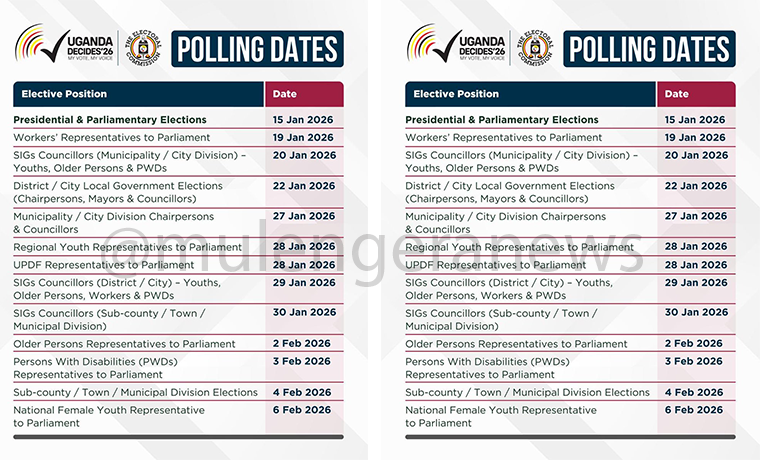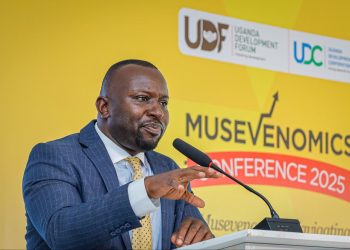By Our Reporters
PPDA, which is the GoU entity charged with regulating public procurements, has landed USD5m (approximately Shs20bn) to wholly digitalize the performance of the procurement function across the 360 entities over which the Authority has jurisdiction. This was revealed by PPDA Manager in charge of the multi-sectoral eGP Florence Nakyeyune. This was on Friday at PPDA head offices where she took journalists through the e-Government Procurement (eGP) project through which GoU hopes to significantly diminish corruption in the public procurement space. The system, whose implementation is already underway, will ensure that all the GoU PDEs will begin to procure goods and services using electronic means. This, government believes, will increase transparency in procurement processes and combat corruption which is very rampant in the public procurement space. PPDA ED Benson Turamye says procurement is more critical in service delivery than many people think. Officials disclosed at the Friday media engagement meeting that, of the Shs26trn budget that was available in the FY2017/18, Shs18trn (69%) went into public procurement by the 360 Procurement & Disposal Entities (PDEs) that are directly regulated by PPDA. Of course of the Shs18trn, UNRA takes the lion’s share with its Shs3trn. Nakyeyune explained that under the eGP database that will be operated, PDEs will be required to strictly comply with timelines set therein to accomplish different stages of the procurement process. This is one way efficiency will be increased because the artificially-created inefficiencies is one way through which corruption tendencies are bred in the public procurement processes.
1.8TRN LOST TO GRAFT ANNUALLY;
Speaking before Nakyeyune, Moses Ojambo the Director capacity building at PPDA had explained how vastly spread real and perceived corruption is in the public procurement space. Quoting the 2016 PPDA perception survey, Ojambo said that 52% of the service providers that were interviewed confessed having been victims of bribe solicitations by public officials involved in giving contracts in the numerous PDEs. He called it “gratifying a public official” and clarified that “yes these are perceptions but they can approximate human behavior.” He said the fact that 52% of the bidders have been confronted with bribery demands is something very frightening because it causes would-be credible service providers and bidders to lose confidence and shun the government procurement processes. This enables quacks, who specialize in shoddy work, to monopolize the public procurement space hence compromising service delivery. He said many of the respondents confessed that in the end, 10% of whatever they are eventually paid goes into bribing to get the job. This means that, if we are to go by PPDA’s own figure of Shs18trn or 69% (off the Shs26trn budget) going into public procurement, then it can be safely concluded that at least Shs1.8trn (which is the 10% of Shs18trn) is annually lost to bribery and corruption.
SCRIBES APPALLED;
That a PPDA official would publicly confess and bring out this information, unprompted, left many journalists in the audience shocked. And mind you these were some of the finest practising journalists anyone would have gathered in one place. You had the like of NTV’s Maurice Mugisha (news manager), Sarah Kagingo of Soft power communications, New Vision Editor Mzee John Kakande, Daily Monitor’s Managing Editor Tabu Butagira, KFM chief editor Catherine Ageno and her equals from influential station like CBS, Capital, Simba and others just to mention a few. Moving a vote of thanks towards the end of the day’s business, Kakande said journalists felt humbled on realizing how much news potential there was around the public procurement space. This prompted PPDA ED Turamye to instantly proclaim the door was wide open. Turyame welcomed scribes to take advantage of the agency’s Public & Corporate Affairs office headed by Sylivia Kirabo to access as much information as they like. He maintained the media are partners on whom PPDA will be counting to sustainably popularize the eGP across board. Nakyeyune revealed that for the start, 10 PDEs had been chosen to participate in the piloting phrase after which more PDEs will be brought on board. She enumerated the 10 pioneer PDEs to include KCCA, UNRA, PPDA, NSSF, NITA, CAA and the Ministries of Finance and Water. These are chosen, she said, because they had already integrated some automation functions in their procurement processes. Then from the 360 PDEs, some two district local governments will participate in the pilot phase namely Mpigi and Jinja. The two were chosen because of their proximity to Kampala. By July 2019, Nakyeyune disclosed, many more PDEs will be brought on board to further deepen the application of the eGP intervention. There will be a payment gateway that is being developed by NITA and will interface directly with the 24 banks that happen to be UBA members. This UBA interface will ease the process by PDEs accounting officers seeking to verify any information regarding any service providers or bidder’s financial stability. Previously, the accounting officers have had to write to the commercial banks seeking financial stability information of each of the bidders but under the new eGP platform, that information will be readily available. NIRA and URA too will be interfaced onto the eGP platform to ensure that bidders who are non-tax compliant are readily identified and locked out of the procurement process. The government MDAs that are major sponsors or promoters of this eGP project are PDDA, NITA, miniseries of Finance & ICT. For benchmarking purposes, Nakyeyune revealed that comparative studies had been carried out in Tanzania, Ghana, Zambia and Cyprus which are some of the countries where the eGP approach has successfully been implemented to very good results.
GOVERNANCE & THE WB BILLIONS;
The project is being rolled out with funding from World Bank to the tune of USD5m. There will also be counterpart funding from the GoU to the tune of Shs1.9bn annually for a period of 5 FYs, according to Nakyeyune. Already the eGP project implementation unit has been established on 4th floor of the UEDCL Towers where the PPDA head offices is located. Staff recruitment is underway, according to Nakyeyune. She says that once fully operational, the new eGP platform will ease the work of the 42 PPDA staffers already assigned the full time monitoring function on how the 360 PDEs are complying with the relevant laws and best procurement practices. She assures all stakeholders that under the eGP, security of information and its integrity will be of paramount importance. The PPDA top management believes that the eGP platform will go along way in reviving confidence of the genuine credible contractors and bidders who had shunned the public procurement space because of too much bribery and corruption. She says under the new e-system, reliance on physical paper work will greatly be diminished. Currently, bidders must make not less than 5 copies of the same bidding documents which many PDEs accounting officers have been complaining about as making the process unnecessarily too bulky. When it comes to the governance structure of the eGP project, Nakyeyune says there will be a steering committee in which Deputy PSST Patrick Ochailap and Accountant General Lawrence Semakula will play very prominent leadership and oversight roles. There is also a change management committee to manage the transition to the new platform and its headed by Moses Ojambo of PPDA. For quality assurance and validation purposes, a high profile firm has been contracted to ensure things are implemented according to plan so that the intended objectives are realized within the stipulated timelines. The PPDA members of top management present (namely Turamye, Ojambo & Director Corporate Affairs Bradford Ochieng) promised to ensure many more media engagements are organized in the coming months to deepen the scribes’ appreciation of the eGP project. For comments, call/text/WhatsApp us on 0703164755!
































